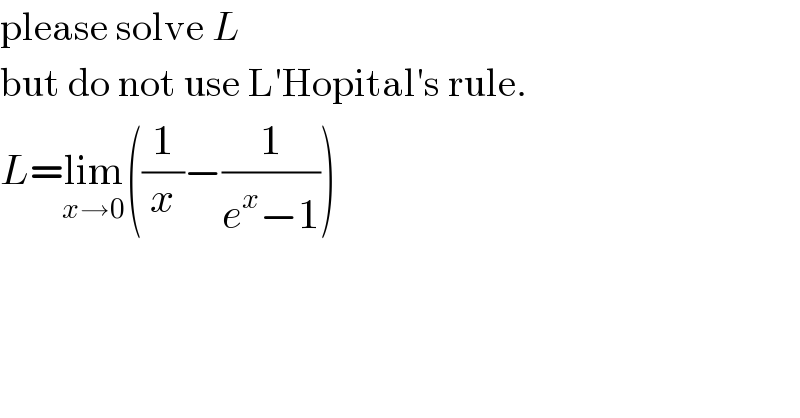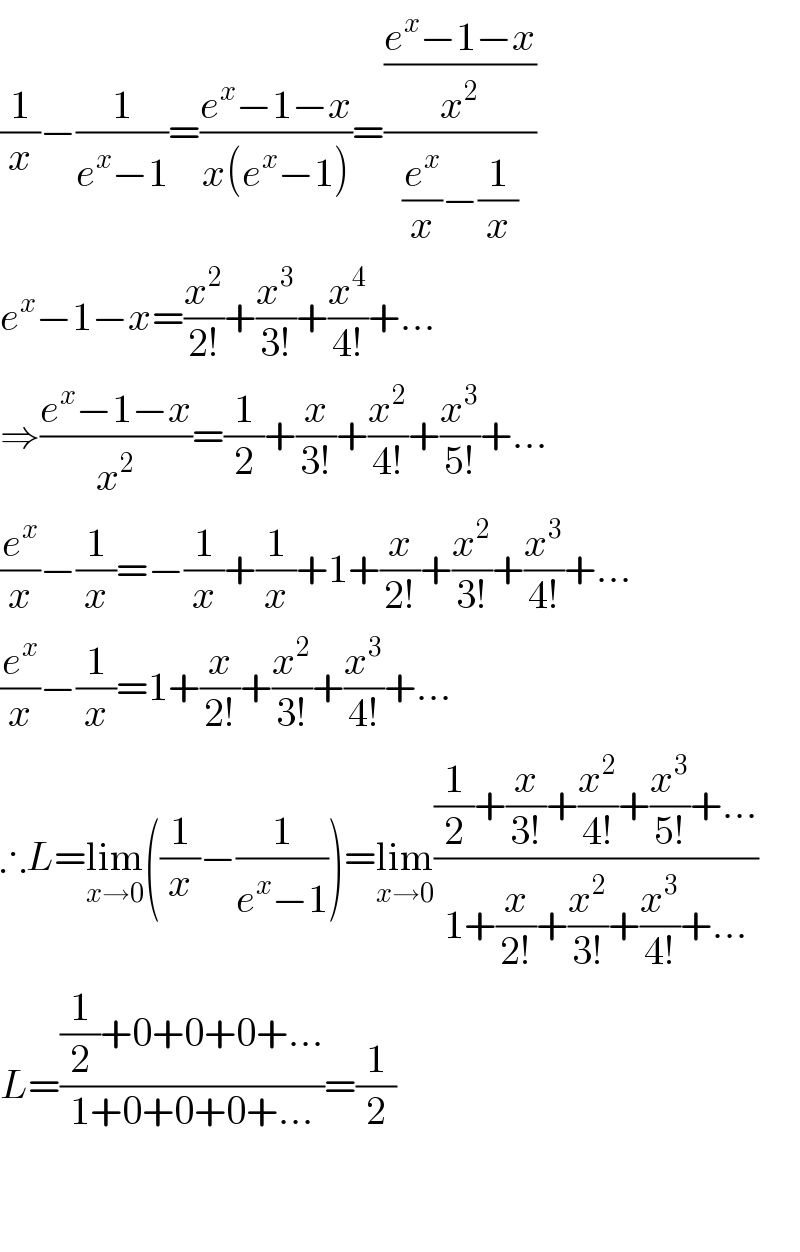
Question Number 6939 by sou1618 last updated on 03/Aug/16

$$\mathrm{please}\:\mathrm{solve}\:{L} \\ $$$$\mathrm{but}\:\mathrm{do}\:\mathrm{not}\:\mathrm{use}\:\mathrm{L}'\mathrm{Hopital}'\mathrm{s}\:\mathrm{rule}. \\ $$$${L}=\underset{{x}\rightarrow\mathrm{0}} {\mathrm{lim}}\left(\frac{\mathrm{1}}{{x}}−\frac{\mathrm{1}}{{e}^{{x}} −\mathrm{1}}\right) \\ $$
Commented by Yozzii last updated on 03/Aug/16

$$\frac{\mathrm{1}}{{x}}−\frac{\mathrm{1}}{{e}^{{x}} −\mathrm{1}}=\frac{{e}^{{x}} −\mathrm{1}−{x}}{{x}\left({e}^{{x}} −\mathrm{1}\right)}=\frac{\frac{{e}^{{x}} −\mathrm{1}−{x}}{{x}^{\mathrm{2}} }}{\frac{{e}^{{x}} }{{x}}−\frac{\mathrm{1}}{{x}}} \\ $$$${e}^{{x}} −\mathrm{1}−{x}=\frac{{x}^{\mathrm{2}} }{\mathrm{2}!}+\frac{{x}^{\mathrm{3}} }{\mathrm{3}!}+\frac{{x}^{\mathrm{4}} }{\mathrm{4}!}+...\: \\ $$$$\Rightarrow\frac{{e}^{{x}} −\mathrm{1}−{x}}{{x}^{\mathrm{2}} }=\frac{\mathrm{1}}{\mathrm{2}}+\frac{{x}}{\mathrm{3}!}+\frac{{x}^{\mathrm{2}} }{\mathrm{4}!}+\frac{{x}^{\mathrm{3}} }{\mathrm{5}!}+...\: \\ $$$$\frac{{e}^{{x}} }{{x}}−\frac{\mathrm{1}}{{x}}=−\frac{\mathrm{1}}{{x}}+\frac{\mathrm{1}}{{x}}+\mathrm{1}+\frac{{x}}{\mathrm{2}!}+\frac{{x}^{\mathrm{2}} }{\mathrm{3}!}+\frac{{x}^{\mathrm{3}} }{\mathrm{4}!}+... \\ $$$$\frac{{e}^{{x}} }{{x}}−\frac{\mathrm{1}}{{x}}=\mathrm{1}+\frac{{x}}{\mathrm{2}!}+\frac{{x}^{\mathrm{2}} }{\mathrm{3}!}+\frac{{x}^{\mathrm{3}} }{\mathrm{4}!}+... \\ $$$$\therefore{L}=\underset{{x}\rightarrow\mathrm{0}} {\mathrm{lim}}\left(\frac{\mathrm{1}}{{x}}−\frac{\mathrm{1}}{{e}^{{x}} −\mathrm{1}}\right)=\underset{{x}\rightarrow\mathrm{0}} {\mathrm{lim}}\frac{\frac{\mathrm{1}}{\mathrm{2}}+\frac{{x}}{\mathrm{3}!}+\frac{{x}^{\mathrm{2}} }{\mathrm{4}!}+\frac{{x}^{\mathrm{3}} }{\mathrm{5}!}+...}{\mathrm{1}+\frac{{x}}{\mathrm{2}!}+\frac{{x}^{\mathrm{2}} }{\mathrm{3}!}+\frac{{x}^{\mathrm{3}} }{\mathrm{4}!}+...} \\ $$$${L}=\frac{\frac{\mathrm{1}}{\mathrm{2}}+\mathrm{0}+\mathrm{0}+\mathrm{0}+...}{\mathrm{1}+\mathrm{0}+\mathrm{0}+\mathrm{0}+...}=\frac{\mathrm{1}}{\mathrm{2}} \\ $$$$ \\ $$$$ \\ $$
Commented by sou1618 last updated on 03/Aug/16

$${Thank}\:{you}\:{very}\:{much} \\ $$
Answered by Yozzii last updated on 03/Aug/16

$${Check}\:{answer}\:{in}\:{comments}... \\ $$
